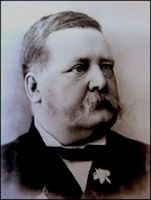

| Sir Thomas's family details are available in my family files. |

Thomas McIlwraith was born on 17 May 1835 in Ayr, South Ayrshire, Scotland, a son of John and and Janet (Howat) McIlwraith. He was educated at Ayr Academy and the University of Glasgow, where he studied civil engineering. He emigrated to Victoria in 1854 and obtained a position as a civil engineer in the railways department, and afterwards with Messrs Cornish and Bruce, railway contractors.
He retained close relations with his brother John, and on 6 June 1863 married Margaret Whannell, sister of John's wife. They had three daughters, Jessie (b. 1866), Mary (b. 1868) and Blanche (b. 1872). He eventually moved to Queensland, but Margaret was reluctant to live in isolated Merivale station. In 1871 she visited Merivale, but soon returned to Melbourne for Blanche's birth. In 1874 they decided to live in Brisbane. Thomas found that she was drinking heavily, and sent her to Scotland where she died in 1877. In 1877 McIlwraith was a founding partner of the North Australian Pastoral Company.
In 1879 he married Harriette Ann Mosman, a daughter of Archibald Mosman and Harriett (Farquharson) Mosman. Harriette was the sister of Hugh Mosman, who discovered gold in Charters Towers, and of Cecilia Mosman, wife of his political colleague Arthur Palmer (also Premier of Queensland), and she gave birth to his fourth legitimate daughter in 1881.
In 1862, having acquired interests in pastoral property in the Maronoa district, he went to Queensland, and in 1868 was elected as representative of that constituency in the Legislative Assembly. In January 1874 he became Secretary for Public Works and Mines in the Ministry of Premier Arthur Macalister, but resigned in the following October. In January 1879 he formed a Ministry in which he was Premier and successively Colonial Treasurer and Colonial Secretary, at a time when the colony was emerging from a depression brought on by three bad seasons. The year 1878-9 closed with a serious deficit, but McIlwraith, helped by good seasons and partly by loan expenditure, brought about an increase in revenue which turned the deficit into a surplus.
Immigrants were pouring in and the colony was developing very rapidly. The population in 1883 was still under 300,000 scattered over a very large area, and the necessity for some general system of local government led to the passing of the Divisional Boards Act. Another important event was the establishment of the British India Postal Service via Torres Strait, but what caused most stir was the annexation of New Guinea carried out under McIlwraith's instructions on 4 April 1883. This met with general approval in Australia, but was disallowed by Lord Derby, the Secretary of State for the Colonies in England. The result was that the way was left open to Germany to annex a large part of the island. But the incident brought home to the Australian colonies, how hampered they were in making representations to the British government by the absence of any central authority that could speak with one voice for all of them.
The Executive Council of Queensland in July 1883 decided to invite the home government to inaugurate a federal Movement. James Service, the Victorian Premier, however, took the more practical step of proposing that an intercolonial conference should be held, which accordingly took place at the end of November. This was the first real step in the direction of Federation, with which McIlwraith was warmly in sympathy. His ministry was defeated in November 1883, on the question of his proposal to construct the Queensland portion of a trans-continental railway line on a land grant system. McIlwraith had been made a K.C.M.G. in 1882, and in 1884 visited Great Britain, where he was given the freedom of his native town, and Glasgow University conferred on him the honorary degree of LL.D.
He left for England on January 15, 1893, to take medical advice and did not return to Australia, being absent from Parliament during the whole of the session of 1895. At the end of that year he was offered but declined the position of Agent-General for Queensland in London. He died in London in 1900 and was buried in his home town of Ayr.
